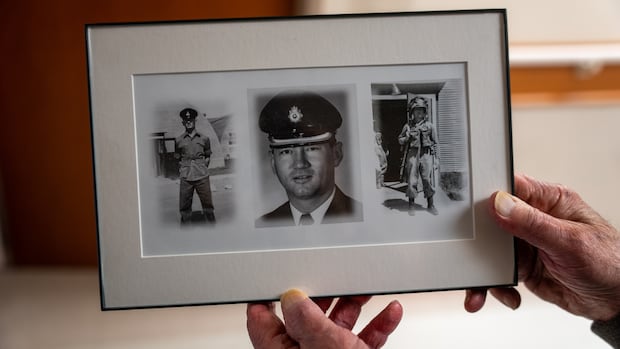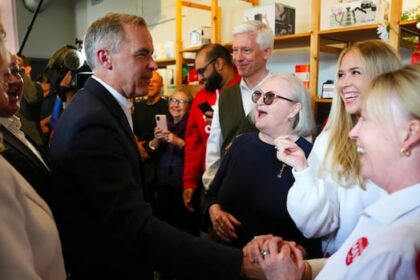Retired major helped keep Canada’s Cold War army movingOttawa’s Roy Martel looks back on a remarkable 37-year military career as he gets ready to mark another Remembrance Day.This Remembrance Day, like all the others, retired major Roy Martel will think of all the old soldiers, like the postmaster in his hometown who returned from the First World War a changed man.”He was different than all the other people in the farming community, mentally, I think. And I noted that as a young man,” Martel said from the armchair in his room at Ottawa’s Perley Health, where he resides in the veterans’ wing. “It had to be horrible, the situations that they were in.”Martel is now 83 and still drives himself around town.He retired nearly three decades ago after a varied and rewarding military career without having fought on the battlefield, though his job did take him to such hot spots as Egypt and the Balkans where Canadian soldiers were deployed as peacekeepers.Martel did serve in one of the most vital roles in any army, however: logistics.Napoleon Bonaparte famously declared that “an army marches on its stomach,” and U.S. Marine Corps Gen. Robert H. Barrow summed it up neatly when he said: “Amateurs talk about tactics, but professionals study logistics.”They knew that in order to succeed, a fighting force must be properly supplied. Troops and equipment must be moved, rations and mail must be delivered, and the difficult yet necessary job of getting everything where it needs to go must be performed safely and efficiently.That’s where Martel came in, and he arrived at a pivotal time for Canada’s post-Second World War military — just as the Cold War was heating up.Roy Martel spent 37 years in the Canadian military, retiring in 1997 at the rank of major. Now he lives in the veterans’ wing at Perley Health in Ottawa. (Antoine Allain/CBC)A war orphanIn a way, Martel was born into it.”I’m a war child, a war orphan,” he began.Martel was born in Nazi-occupied Poland in 1942, and at just 18 months was adopted by an ethnic German couple living on a farm near the Polish city of Łódź. Martel doesn’t know what happened to his birth parents.”In those days we didn’t talk about adoption, so I didn’t ask personal questions as I was growing up,” he said.Fleeing the advancing Russians, the family spent three years as refugees in post-war Germany before emigrating to Canada, where they joined Martel’s uncles in a largely Mennonite area of southern Manitoba. Around the age of 17, he “rebelled” and flunked Grade 11.”My father said, ‘If you’re not going to study, you’re not hanging around here,'” he recalled.Martel left the family dairy farm and moved to Winnipeg where his brother got him a job as a labourer with a masonry firm. He quit after a dispute with a foreman one winter day. On the bus ride home he passed the Minto Armoury, where a recruitment poster advertised then prime minister John Diefenbaker’s Special Militia Training Plan, a six-week crash course in search and rescue, civil defence and survival. It was nearing the time of the Cuban Missile Crisis, and Martel was intrigued. Plus, he needed a job.”I liked the discipline, the organization that I experienced … so I decided to join the army,” he said.Joining the ‘RC Sigs’The army aptitude test detected the young man’s keen problem-solving abilities — back on the family farm he had learned to fix things when they broke — so Martel was assigned to the Royal Canadian Corps of Signals as a technician. (Back then, the “RC Sigs” was a combat support unit of the Canadian Army, and in 1968, the army, navy and air force combined to form the Canadian Forces.)He sailed through basic training, though many did not. Of the 50 recruits who began the four-month course in Edmonton, several never finished. The ones who did were mostly Ottawa Valley lumberjacks, Maritime fishermen and Prairie farmers like Martel.Photos and berets are displayed in a cabinet outside retired major Roy Martel’s room at Perley Health. His wife Rita, seen here in her nurse’s uniform, lives in a nearby retirement home. The couple has applied for spousal reunification. (Antoine Allain/CBC)Then it was off to signal corps school at CFB Kingston, where his duties included responding to jailbreaks from the city’s prisons (there weren’t any) and guarding the scene of a navy plane crash where, according to newspaper reports, firemen had to turn their hoses on the crowds to keep nosy onlookers away from the wreckage.In Kingston he also smashed his ankle playing hockey, delaying his training and his first posting to CFB Petawawa.There, he learned that his mother was dying and his father had been badly injured saving cattle from a burning barn back home in Rosenfeld, Man.In an act of compassion that has stayed with Martel to this day, his commanding officer put him on a train back to his home province, where he was able to help tend to his parents while serving in the Manitoba Signal Squadron.He also finished high school there and qualified for officer training school, but struggled with the engineering courses and so transferred to the Royal Canadian Army Service Corps, the logistics and transport wing of the Canadian Army.Canadian peacekeepers on patrol in Bosnia in 1994 or 1995. (Submitted by John Parkinson)A proud young officerThree years of university courses and summers at CFB Borden later, Martel was promoted to lieutenant. It was a proud moment — a photo of the occasion sits in his room today.The young officer was posted to CFB Moose Jaw, an air force base, where he had the time of his life.”The room was on the same floor as all the crazy Snowbird pilots, and they adopted me and I became one of them,” Martel remembers with a sly smile. “It was all fun.” It’s also where he married his wife Rita, a young nurse from the same Mennonite region where he grew up. They’d met in a pub near Winnipeg’s Misericordia Hospital. He was there drinking beer with some army buddies when the nurses came in after their shift.After a stint back in Winnipeg, Martel, now a captain, was posted overseas to CFB Baden-Soellingen in West Germany, home to three Canadian fighter squadrons and an infantry battalion. A few months later he was joined by Rita, their little daughter Jodi and new baby Stefanie. The Cold War up closeIn Germany, Martel learned that effective leaders can’t sit behind desks all day.”You’ve got to be around — the troops gotta know who the hell you are,” he said.International tensions were high, and Martel suddenly found himself at centre stage.”We had our NATO exercises regularly, and therefore we were practising our Cold War response,” he said. The worst-case scenario? “Russian tanks coming across the plains, and their aircraft, of course. We had to be able to intercept.”Retired major Roy Martel tells his story to the CBC’s Alistair Steele. (Antoine Allain/CBC)Martel was made major at 38, and his military career would take him across Canada and around the world, including missions and postings in Washington D.C., Egypt, Cyprus and Bosnia.He retired compulsorily in 1997, and immediately started working for the Department of Foreign Affairs, organizing logistics for major conferences including the G8 in Kananaskis, Alta., in 2002.Looking back, Martel says he genuinely enjoyed the challenges of his job — even when his convoy was held up for four hours at the Bosnian border, only to become mired again when a truck overturned on a narrow, winding road. The most difficult moment, he recalled sadly, was the death of a soldier under his command in a snowplowing accident in Winnipeg.No regretsStill, he says he’d do it all over again if he could.”I don’t resent anything, really,” he said. “I should have taken the left fork in the road occasionally, but we can all tell those stories.”These days, Martel enjoys visiting his daughters and their families, and he routinely drives to a nearby retirement home to spend evenings with Rita. The couple has applied for spousal reunification.On Nov. 11, he’d often attend ceremonies at various cenotaphs around Ottawa, then join some of his army buddies for a beer at the local legion.This year, Martel plans to attend the Remembrance Day ceremony at Perley Health, where he’ll think of all the old soldiers and look back on his own remarkable career in the service of Canada.
Thursday, 5 Mar 2026
Canada – The Illusion
Search
Have an existing account?
Sign In
© 2022 Foxiz News Network. Ruby Design Company. All Rights Reserved.
You May also Like
- More News:
- history
- Standing Bear Network
- John Gonzalez
- ᐊᔭᐦᑊ ayahp — It happened
- Creation
- Beneath the Water
- Olympic gold medal
- Jim Thorpe
- type O blood
- the bringer of life
- Raven
- Wás’agi
- NoiseCat
- 'Sugarcane'
- The rivers still sing
- ᑲᓂᐸᐏᐟ ᒪᐢᑿ
- ᐅᑳᐤ okâw — We remember
- ᐊᓂᓈᐯᐃᐧᐣ aninâpêwin — Truth
- This is what it means to be human.
- Nokoma











